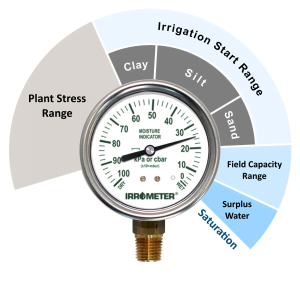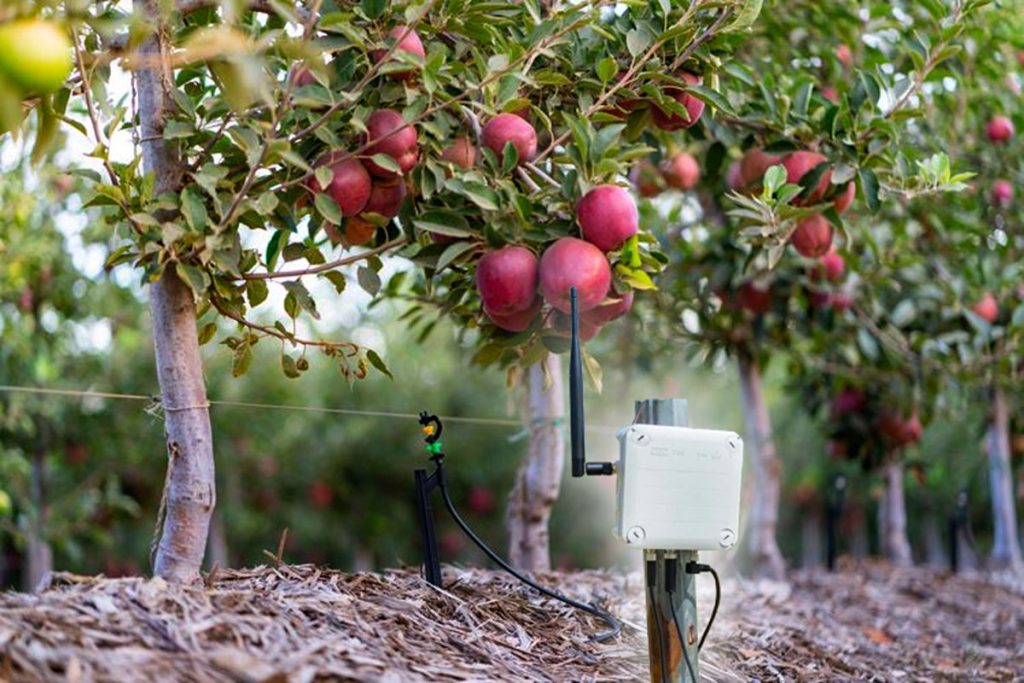In the world of agriculture, water is a precious resource. Getting irrigation just right is a delicate balancing act that directly affects crop quality and yield. Good management of irrigation water will increase crop yields, improve crop quality, conserve water, save energy, decrease fertilizer requirements, and reduce nonpoint source pollution. All of these are positive benefits and help contribute to profitable crop production.
One critical factor in this equation is soil water tension. In this article, we will explore soil water tension, the use of sensors to measure it, and how it helps optimize irrigation, all within the context of apple cultivation.
Understanding Soil Water Tension
Soil Water Tension is a measure of the force required to extract water from the soil by plant roots. It’s a crucial parameter because it indicates how easily or difficult plants can access water. Soil water tension (or matric potential) has to be overcome for the plant to move water into its root system. As soil water is removed from soil, soil tension increases. Soil water tension is typically measured in centibars (cb) or kilopascals (kPa).

- Low Tension / Saturated (0-10 cb or 0-10 kPa): Indicates that soil is saturated and water is readily available to plants.
- Low Tension / Wet (10-30 cb or 10-30 kPa): Suggests that the soil is adequately wet and plants can access water easily.
- Moderate Tension / Needs Irrigation (30-60 cb or 30-60 kPa): Indicates that plants are having difficulty to extract water. This is the usual range for irrigation (most soils). It is the average field SWT prior to irrigation, varying with the crop, soil texture, weather pattern, and irrigation system.
- High Tension / Dry (>80 cb or >80 kPa): Indicates soil is becoming dangerously dry. Plants are struggling to extract water, leading to water stress.
Soil water tension is highly dependent on soil type, with sandy soils generally having lower tension values and clayey soils having higher values for the same moisture content. Crop type and growth stage also influence the ideal soil water tension range.
Soil Water Tension Sensors for Precision Irrigation
Soil water tension sensors, such as tensiometers and granular matrix sensors, provide growers with real-time data on the moisture levels within the root zone of apple trees. This information is invaluable for making irrigation decisions that can significantly impact the health and productivity of the orchard.
The data generated by these sensors helps growers avoid both under- and over-irrigation, two issues that can have detrimental effects on crop yield and quality. Under-irrigation can lead to water stress in apple trees, resulting in fruit drop, reduced fruit size, and compromised fruit quality. On the other hand, over-irrigation not only wastes water and energy but also increases the risk of root diseases and nutrient leaching.
For example, a sensor can tell you whether the rain last night was really enough for your apple trees. It can tell you whether an overcast day is reducing crop water enough to delay the next irrigation. It can tell you whether you will need to irrigate more often in July than in June.
How Sensors Aid in Irrigation Optimization
- Precise Irrigation Timing: Soil water tension sensors allow growers to track changes in soil moisture status, helping them identify the ideal time to initiate irrigation. For apple orchards, this is particularly important during critical growth stages like flowering and fruit development.
- Preventing Water Stress: By monitoring soil water tension, growers can prevent water stress in apple trees. Maintaining tension within the recommended range ensures that trees have consistent access to moisture, reducing the risk of fruit drop and poor fruit quality.
- Water Conservation: Apple orchards equipped with soil water tension sensors can avoid over-irrigation. Over-watering not only wastes resources but can also lead to root diseases and nutrient leaching.
- Crop-Specific Management: Different crops have distinct tolerance levels for soil water tension. Apples generally thrive with tension levels ranging from 10 to 40 cb or kPa. Sensors help customize irrigation strategies based on crop requirements.
Crop-Specific Considerations
Apple trees have specific moisture requirements during various growth stages. During flowering and fruit development, they need consistent moisture to support fruit development. The optimal soil water tension levels for a particular crop, in this case, apple trees, depend on several factors:
- Crop Needs: Different crops have varying sensitivity to water stress. Apples are no exception. To ensure healthy growth and high-quality fruit, it’s essential to tailor irrigation practices to meet the specific water requirements of apple trees.
- Soil Texture: Soil type plays a significant role in determining how water is retained or drained. Sandy soils have a lower water-holding capacity and, therefore, require more frequent irrigation. In contrast, clayey soils retain moisture better but may necessitate less frequent watering.
- Climate: Environmental conditions, including temperature, humidity, and precipitation patterns, impact a crop’s water demand. Monitoring soil water tension allows growers to adjust irrigation schedules based on prevailing weather conditions.
Understanding Management Allowable Depletion (MAD)

Let’s start with the basics. Soil water fills about 25% of the space in the soil. This water is held in the pore space, or the cracks and empty spaces between soil particles. When all of the pore space is completely filled, the soil is said to be saturated. Excess water will drain out over time to a point where the soil will hold a certain amount of water indefinitely against the downward pull of gravity. This soil water content is called field capacity. As a plant’s roots remove water from the soil, the soil will dry out to a point where the suction or pull of the soil on the water exceeds the plant’s ability to absorb water. At this point, the plant will wilt and die. This soil water content is referred to as permanent wilting point. The difference between field capacity and permanent wilting point is the available water holding capacity (AWC) of the soil.
- Saturation. Soil pores are fully filled with water.
- Field capacity. Soil has reached the maximum amount of water it can hold. Under this status, excess water has drained, and a portion of the soil pores are filled with air. The force required for the plant root system to uptake water at this status is very small.
- Permanent wilting point. Soil has reached the water level at which plants can no longer extract water from it.
For effective irrigation scheduling, it’s important to understand the concept of Management Allowable Depletion (MAD) or irrigation trigger point. MAD represents the point at which a crop begins to experience water stress. It is the maximum allowable Soil Water Tension value at which available moisture is not limiting crop development. At this level, irrigation should be started to prevent water stress.
Typically, most crops, including apples, show signs of stress when soil water depletion reaches 30-50% of the available water holding capacity (AWC) in the root zone.
As apple trees progress through different growth stages, irrigation strategies should adapt accordingly:
- Germination and Early Growth: Ensure that the soil in the germination and early-growth root zone remains consistently moist. Proper root development relies on adequate moisture, and dry soil layers can hinder root growth.
- Critical Growth Period: As the crop approaches its critical growth phase or peak water-use period, reduce the allowable soil water deficit to minimize the risk of water stress and yield loss.
- Maturity: As the apple crop nears maturity, you can generally allow for a greater soil water deficit without causing stress to the trees.
Soil water tension is a crucial factor in the success of apple orchards. The use of soil water tension sensors empowers growers to optimize irrigation practices. At Orchardly, we regularly monitor the soil tension levels, and provide actionable advisories to our growers specific to soil type and crop-specific needs, ensuring healthy, high-yield apples while conserving valuable water resources.


